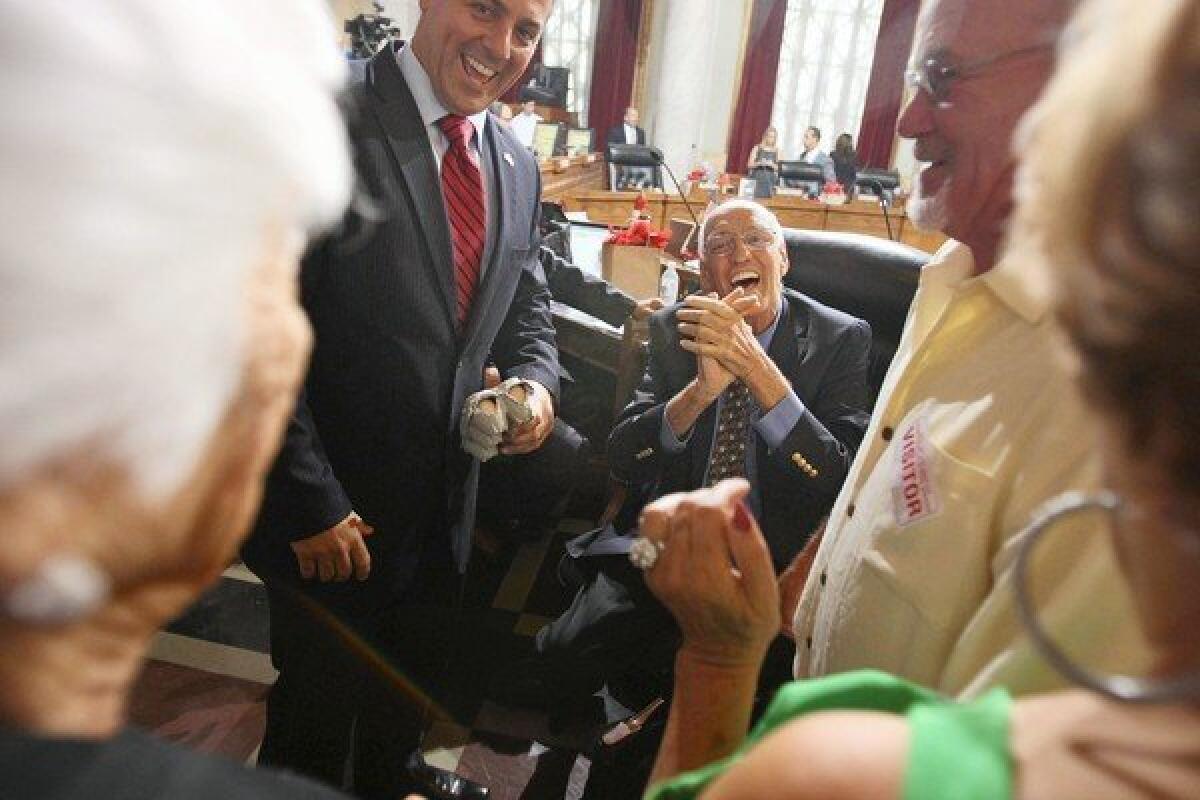L.A. repeals its ban on pot stores

After struggling for years to regulate storefront pot shops, the Los Angeles City Council retreated Tuesday, voting to repeal the carefully crafted ban on medical marijuana dispensaries it approved a few months ago.
The move shows the political savvy of the increasingly organized and well-funded network of marijuana activists who sought to place a referendum overturning the ban on the March ballot, when the mayor and eight council seats will be up for grabs.
It also leaves Los Angeles, once again, without any law regulating an estimated 1,000 pot shops, which some describe as magnets for crime and others call a source of relief for those who are desperately ill.
The council’s 11-2 vote came after an impassioned plea from Councilman Bill Rosendahl, a medical marijuana patient who is fighting a rare form of cancer. Looking gaunt and speaking in a faint voice, Rosendahl asked his colleagues how sick patients like him would be able to acquire the drug if the ban remained in place.
“Where does anybody go, even a councilman go, to get his medical marijuana?” he said.
Like other cities in California, Los Angeles has strained to find a way to balance the state law that permits medical marijuana against federal statutes that continue to make its sale and use a crime. Federal officials recently launched a crackdown on pot dispensaries in the city, leading one council member to suggest that any regulation is beyond L.A.’s control.
“That is our relief,” Councilman Jose Huizar said of the federal crackdown, which included raids on several dispensaries last week in Eagle Rock, Boyle Heights and other neighborhoods. Dozens of other pot shops received letters ordering them to close within two weeks.
But council opponents of dispensaries said they would try to find other ways to shut down marijuana shops by using laws that are already on the books. Immediately after the vote, Councilman Mitchell Englander called on the city to prosecute medical marijuana businesses for violating zoning laws because they are not on the city’s list of approved land uses.
In another motion Tuesday, exasperated council members called on the Legislature “to address the inadequacies of state law.” Council members asked for clarity on what municipalities can do to regulate dispensaries and called for stricter regulations of physicians who provide medical marijuana recommendations. They also said patients should be required to demonstrate six months of medical history to obtain recommendations.
The city’s ban was enacted in July by council members who complained that neighborhoods were being overrun by dispensaries. It called for storefront marijuana sales to be outlawed, but allowed small groups of patients to cultivate and share the drug on their own.
The ban was the last in a string of ordinances the council has adopted since 2007, when the city imposed a moratorium on dispensaries. A loophole in the first law allowed hundreds of new pot shops to proliferate.
Subsequent ordinances have generated more than 100 lawsuits from dispensary operators and others, according to the office of City Atty. Carmen Trutanich.
Many medical marijuana activists say they agree that there are too many dispensaries, and have asked for regulation. They have called on the city to enact an ordinance supported by Rosendahl and Councilman Paul Koretz that would allow pot shops that opened before the 2007 moratorium to remain.
Tuesday’s repeal of the ban marked a major victory for the coalition of marijuana activists who came together to put the referendum on the ballot. The effort was led by an advocacy group called Americans for Safe Access, a group of dispensaries called the Greater Los Angeles Collective Alliance and the United Food and Commercial Workers, Local 770, which has organized workers at more than 50 dispensaries.
By collecting tens of thousands of signatures to qualify the referendum, the activists forced council members to decide whether to rescind the ordinance or put the matter on the March ballot.
Huizar said he believes medical marijuana proponents would have put up a lot of money to fund the referendum to “protect their profits.”
“They have attorneys, they have lobbyists, they have unions,” he said.
Huizar accused opponents of the ban of using patients “as a pretense,” and said most people who obtain medical marijuana from stores are recreational users.
The council heard from several people during Tuesday’s meeting who insisted that medical marijuana had been invaluable in helping them cope with their medical problems. None was more effective than Rosendahl.
The 67-year-old councilman began taking medical marijuana a decade ago to manage neuropathy, a stinging pain in his feet. He told council members that he used the drug “occasionally at night” until he was diagnosed with ureteral cancer three months ago. The drug has helped him during chemotherapy, he said.
He criticized President Obama’s handling of the medical marijuana issue and spoke against some of the recent federal raids of dispensaries. “If I can’t get marijuana, and it’s medically prescribed, what do I do?” he said.
Because the vote was not unanimous, the repeal will come back for a second vote next week.
kate.linthicum@latimes.com
More to Read
Start your day right
Sign up for Essential California for news, features and recommendations from the L.A. Times and beyond in your inbox six days a week.
You may occasionally receive promotional content from the Los Angeles Times.







